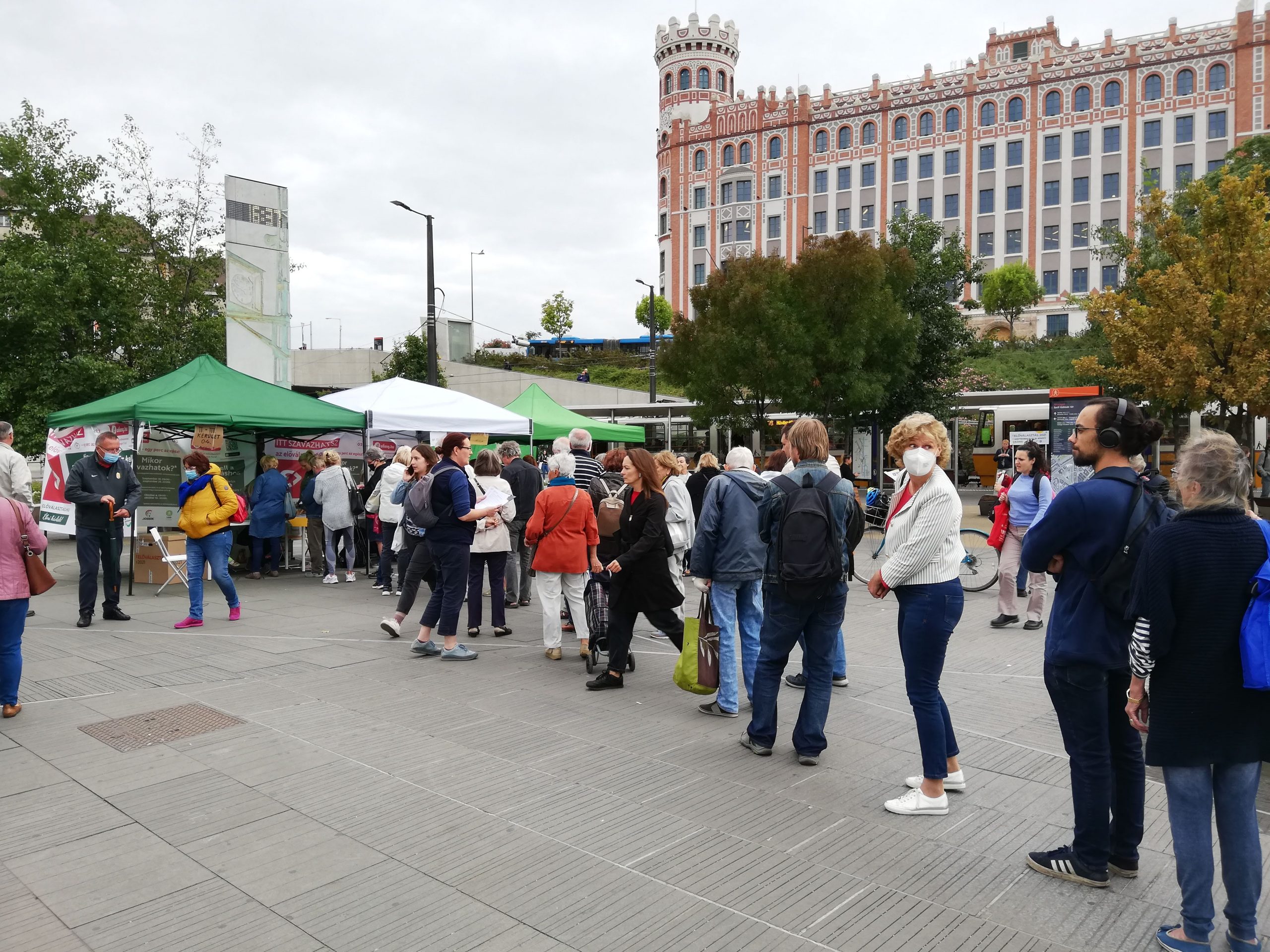
The participating opposition parties promised the announcement of a final PM candidate to go against Viktor Orbán by October 23rd.Continue reading

The first round of the opposition primary elections started this Saturday, the 18th of September. The start was not a smooth one: the software crashed and the election had to be paused. It resumed on Monday morning. People all over the country can observe long queues of voters waiting to cast their ballots for their favorite local and prime minister candidates.
In 2020, six parties: DK, Jobbik, LMP, Momentum, MSZP, and Párbeszéd decided to run together in the 2022 parliamentary elections to nominate a common candidate for prime minister, and put forward 106 common candidates and a common list in 106 single-member constituencies in Hungary.
Voting in the first round of the primaries was (or would have been) possible in person at 775 tents as of Saturday morning, and online after a video pre-registration procedure. Voting- starting at 8 a.m. in most places- was already not without problems, but by 10 a.m. the whole system was down.
Because of the crash, the elections had to be paused. The IT management of the primaries was undertaken by the organization aHang. “By further developing the toolkit of the 2019 Budapest mayoral primaries, we aim to deliver nationwide primaries programs,” they posted on their website.
The first reaction from the opposition during the weekend was that the crash happened because of the large number of people who wanted to vote. “The unexpectedly large participation, also for the organizers, requires an immediate increase in technical resources. The National Electoral Commission, after reviewing the process, decided to suspend voting for two hours to allow for adequate expansion and to ensure the smooth running of the poll. During this period, a rapid, efficient, and secure expansion of technical support will take place,” they wrote in a Facebook post. But two hours turned out to be almost a whole weekend-long break. So the commission decided to extend the first round of the voting process until September 28th.
While the Primaries 2021 (Előválasztás 2021) Facebook page thanked the voters for their participation when announcing what was supposed to have been a two-hour break, in a later post, they referred to an outside attack. “Since early yesterday afternoon, the opposition parties and aHang’s IT staff have made a number of changes to the background system for the primaries. And the opposition parties have involved Ferenc Frész, a senior cyber defense expert at Cyber Services Zrt. who has previously worked with the Council of the European Union and NATO, in the investigation into the causes, methods, and origin of a distributed denial-of-service attack (DDoS attack),” according to the post.
György Magyar, lawyer and chairman of the opposition parties’ Election Committe, said that the votes cast could have been lost, and asked those who cast them to repeat their votes. However, Ákos Bedő, a politician from the Momentum Party, said that all the votes cast before the shutdown remained valid.
Budapest mayor Gergely Karácsony said that the attacks were coming from China, adding that “every road leads to China from Hungarian politics.” He emphasized, however, that they solved the problems and it is possible to vote again.
Ruling party Fidesz reacted by saying “Do not blame your own clumsiness on others!”
The opposition has announced it is going to file a police report this week against an unknown perpetrator for the hacking of the pre-election system.
The distributed denial-of-service attack is widespread in the world. The Hungarian government and police were talking about it repeatedly every time the government’s vaccine registration website was down.
The primaries are not run by IdomSoft Zrt., a company that collects and manages almost all state data from death certificates, election software, and to all citizens’ health data. In comparison, aHang is an NGO.
One explanation could be the lack of preparation and organization which might be more likely to happen in the case of an NGO than in the case of a bigger, more often-used software. Still, it does not change the fact that people could not use the site.
However, if it was a DDoS attack as the opposition suggests, then the only thing certain about it is that it requires money, solid organization, and an IT background, as the Hungarian RFE/RL (Szabad Európa) reported.
The opposition promised to restart the voting process this Monday on the 20th at 7 am. However, the pre-registration still did not work before 10 am, Telex reported. People could vote on the spot in tents set up in public areas, but that was not always a smooth process either. According to ATV, in several places the system was down for several minutes, and it took a quarter of an hour, including the restart, for voting to resume. This was the case for Klára Dobrev too when she went to vote. But in the end, the DK candidate managed to cast her ballot as well.
Since then, it seems that the voting process is now continuing without any problems.
67,000 people already voted on Monday. After 10 a.m. the system worked again and still does ever since. Others who want to cast a ballot are able to do so until the extended deadline, September 28th.
Featured image: Voters waiting at a tent for their turn to cast their ballots. Photo by Hungary Today